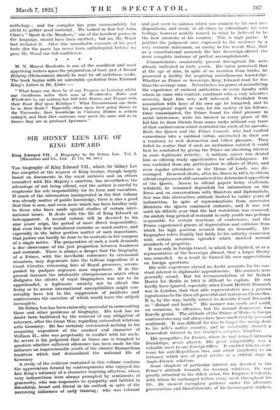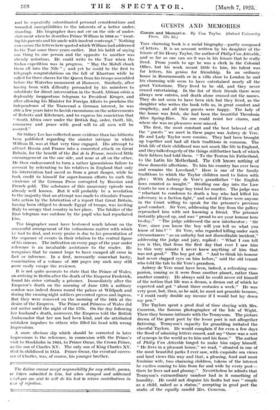SIR SIDNEY LEE'S LIFE OF KING EDWARD
THE biography of King Edward VII., which Sir Sidney Lee has compiled at the request of King George, though largely based on documents in the royal archives and on others consulted with His Majesty's sanction, has nevertheless the advantage of not being official, and the author is careful to emphasize his sole responsibility for its form and execution. If much of the information incorporated in the first volume was already matter of public knowledge, there is also a good deal that is new, and even more which has-been familiar only to those who have made special studies of certain inter- national issues. It. deals with the life of King Edward as heir-apparent. A second volume will be devoted to his nine years' reign, the period of more direct responsibility. But even this first instalment contains so much matter, and especially in the latter portion matter of such importance, that justice can hardly be done to its contents in the compass of a single notice. The preparation of such a work demands a due observance of the just proportion between frankness and restraint. There is always a danger that the biography of a Prince, with the inevitable references to ceremonial occasions, may degenerate into the tedious exposition of a Court Circular, rehearsing lists of Royal presences, accom- panied by quelques seigneurs sans importance. If in the present instance the intolerable obsequiousness which often disfigures the efforts of royal biographers was not to be apprehended, a legitimate anxiety not to offend the living or to arouse international susceptibilities might con- ceivably have led to the suppression of incidents and controversies the omission of which would leave the subject incomplete.
Sir Sidney Lee has been eminently successful in surmounting these and other problems of biography. His task has no doubt been facilitated by the removal of any obligation of reticence, after the Great War, regarding antecedent relations with Germany. He has certainly extenuated nothing in his unsparing exposition of the conduct and character of William IL, who was perpetually in conflict with his uncle. So severe is his judgment that at times one is tempted to question whether sufficient allowance has been made for the influence on impressionable youth of the sinister Bismarckian tradition which had demoralized the national life of Germany A study of the evidence contained in this volume confirms the appreciation formed by contemporaries who enjoyed the late King's intimacy of a character inspiring affection, whose very indiscretions were always prompted by sentiments of generosity, who was responsive to sympathy and faithful in ,friendship, broad and liberal in his outlook in spite of the ,narrowing influences of early training ; who was tolerant and just even to opinion which ran counter to his own pre- dispositions, and ready at all times to subordinate his own feelings, however acutely roused, to what he believed to be the best interests of his country. This is high praise. It justifies the judgment once expressed to the reviewer by a very eminent statesman, an enemy in the recent War, that as a constitutional monarch the late Sovereign offered the most complete instance of perfect accomplishment.
Characteristics consistently present throughout life were already indicated in early youth. His tutor perceived that at the age of nine, in spite of an aversion from books, he possessed a facility for acquiring miscellaneous knowledge. Whether as Prince or Sovereign, King Edward read far less than the average man. Nevertheless his.power of assimilating the experience of eminent authorities in every faculty with whom he came into contact, combined with a very retentive memory, kept him very well informed. Precluded from association with boys of his own age he hungered, and to his preceptors' regret in vain, for the society of his fellows. Once emancipated, the Prince found his chief pleasure in social intercourse, while his interest in every phase of life led him to draw friends from many ranks without any trace of that exclusiveness which restricted the circle of his.parents. Both the Queen and the Prince Consort, who had exalted earnestness into a cardinal virtue, mistrusted in their son a tendency to seek distraction and follow pleasure. They failed to realize that if such an inclination existed it could best be combated by giving the Prince an absorbing interest in some legitimate activity. A military career was denied him as offering ready opportunities for self-indulgence. He was excluded from any participation in affairs of State, and even regular attendance in the House of Lords was dis- couraged. Renewed efforts, after his illness in 1874, to obtain official employment still encountered the determined opposition of the Queen. Access to official papers being studiously withheld, he remained dependent for information on the Press and on conversations with Ministers and diplomatists. Nor was this obstructive attitude limited to earlier years of indiscretion. In spite of representations from successive Ministers the Queen continued obdurate, and it was not until his fiftieth year that the last restriction was removed. An unduly long period of restraint in early youth was perhaps responsible for certain reactions of exuberance, and the Prince experienced phases of depreciation and criticism from which his high position secured him no immunity. His biographer refers frankly but fairly to his unlucky connexion with certain notorious episodes which shocked normal standards of propriety.
It was only in foreign travel, in which he delighted, or as a representative of the Sovereign abroad, that a larger liberty was conceded. As a result he formed his own appreciations on foreign questions.
His wide experience abroad no doubt accounts for his con- stant interest in diplomatic appointments. His counsels were generally sound. But his recommendation of Sir Robert Morier for Berlin in 1884 is difficult to explain. Ile can hardly have ignored, especially when Count Herbert Bismarck was in London, that that able representative was a persona ingratissima to the then all-powerful and rancorous Chancellor. It is, by the way, hardly correct to describe Count Bismarck as " distant and harsh." His manner was crude and could, on occasions, be offensive, but his normal demeanour was heavily genial. The attitude of the Prince of Wales in foreign controversies may not always have been unaffected by personal sentiment. It was difficult for him to forget the wrong done to his wife's native country, and he constantly showed a benevolent interest in her brother's adoptive kingdom.
His sympathies for France, where be had formed intimate friendships, never altered. His great adaptability was a valuable asset to our Foreign Office. It enabled him to over come his anti-Republican bias, and admit Gambetta to an intimacy which was of great service at a critical stage in Anglo-French relations.
Some chapters of particular interest arc devoted to the Prince's attitude towards his German relatives. He was greatly attached to his eldest sister, the Empress Frederick, with whom he exchanged letters every week throughout his life. He showed exemplary patience under the alternate provocations and blandishments of his inconsequent nephew, and he repeatedly subordinated personal considerations and wounded susceptibilities to the interests of a better under- standing. His biographer does not err on the side of under- statement when he describes Prince William in 1888 as " treat- ing his parents and his uncle with insolent contempt." Nothing can excuse the letters here quoted which William had addressed
to the Tsar some three years earlier. But his habit of saying one thing to one peison and the opposite to an-other was
already notorious. He could write to the Tsar when the Sudan expedition was in progress. " May the Mandi chuck them all into the Nile " ; and yet he could be the first to telegraph congratulations on the fall of Khartum while he called for three cheers for the Queen from his troops assembled before the Waterloo monument at Hanover. Similarly, after having been with difficulty persuaded by his ministers to substitute for direct intervention in the South African crisis a deplorably inopportune telegram to President Kruger, and after allowing his Minister for Foreign Affairs to proclaim the independence of the Transvaal a German interest, he was able a few years later to lavish encomiums on the achievements of Roberts and Kitchener, and to express his conviction that " South Africa once under the British flag, order, thrift, life, commerce and peace with good will to all men will be assured."
Sir Sidney Lee has collected more evidence than has hitherto been published regarding the sinister intrigue in which William II. was at that very time engaged. His attempt to attract Russia and France into a concerted attack on Great Britain, for the benefit of the Roi de la Prusse, received little encouragement on the one side, and none at all on the other. Ile then endeavoured to turn a rather ignominious failure to account by reiterating to his relatives in England that only his intervention had saved us from a great danger, while he took credit to himself for super-human efforts to curb the virulence of the German Press corrupted by Russian and French gold. The substance of this unsavoury episode was already well known. But it will probably be a revelation to the majority that an attempt was made to stimulate France into action by the fabrication of a report that Great Britain, having been obliged to denude Egypt of troops, was inviting Italy to occupy that country in her place. The falsifier of the Ems telegram was outdone by the pupil who had repudiated The biographer. must have bestowed much labour on the succeSsfid arrangement of the voluminous matter with which 1.e had to deal, and every praise is due to his presentation of the sequence of events in their relation to the central figure of his canvas. The indication on every page of the year under reference is an invaluable assistance to the reader. He recognises that he cannot hope to have escaped all error in fact or inference. In a first, necessarily somewhat hasty; examination of a volume of 800 pages any such may still more easily escape the reviewer.
It is not quite accurate to state that the Prince of Wales, on arriving in Berlin after the death of the Emperor Frederick, found .his sister virtually a prisoner. Immediately after the Emperor's death on the morning of June 15th a military cordon was indeed drawn round the palace at Wildpark and during the ensuing night soldiers prevented egress and ingress. But they were removed on the morning of the 16th at the desire of the Empress. The Prince and Princess of Wales did not arrive until the night of the 17th. On the day following her husband's death, moreover, the Empress told the British Ambassador that her son had been kind, and she attributed mistaken impulses to others who filled his head with wrong iMpressions.
A more obvious slip which should be corrected in later impressions is the reference, in connexion with the Prince's visit to Stockholm in 1864, to Prince Oscar, the Crown Prince, as the son of Charles XV. The only son of King Charles XV. died in childhood in 1854. Prince Oscar, the eventual succes- sor of Charles, was, of course; his younger brother.



























































 Previous page
Previous page